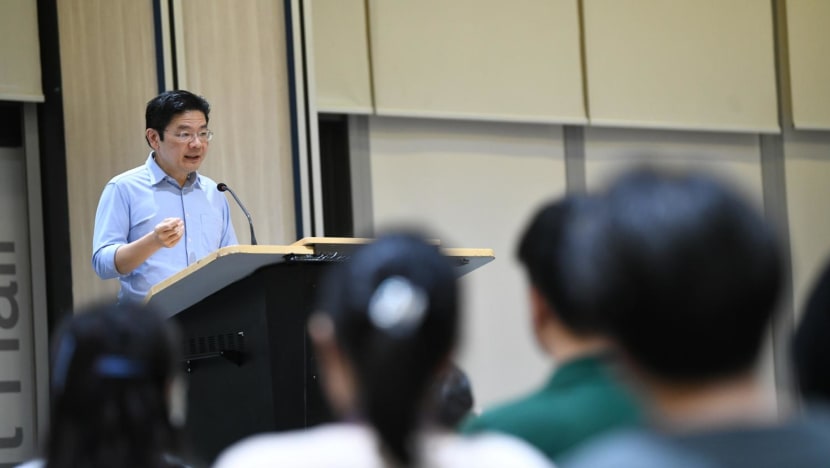Protecting workers, not jobs, is Singapore’s approach to employment resilience: DPM Wong
Protecting jobs will only hold back the process of innovation and hinder the creation of new and better jobs, says Deputy Prime Minister Lawrence Wong.

Deputy Prime Minister Lawrence Wong speaking at the fourth and final session of The Ngee Ann Kongsi-Institute of Policy Studies Citizens’ Panel on Employment Resilience. (Photo: Institute of Policy Studies/Jacky Ho)
SINGAPORE: Singapore’s approach to employment resilience is to protect workers, not jobs, Deputy Prime Minister Lawrence Wong said on Saturday (Mar 25).
Speaking at the closing of the Citizens’ Panel on Employment Resilience, Mr Wong said the government will redouble efforts to help every Singaporean reskill, upskill and transit more easily to take up new job opportunities.
He noted that Singapore does not seek to protect the job, as this will only hold back the process of innovation, as well as hinder the creation of new and better jobs.
Some jobs will become obsolete because of innovation and technical advancements, he said. However, new jobs will also be created, which will usually be more productive and pay better wages, he added.
He cited the example of maintenance workers, who used to have to slowly climb the exterior of buildings to conduct inspections. Now, a properly trained drone pilot can do the same task in a faster and safer way.
“In a dynamic and healthy economy, there will always be a flow of innovation, new ideas and new ways of doing things, that is to be expected,” said Mr Wong, who is also the finance minister.
“In fact, we want that to happen in a healthy economy.”
Mr Wong also said sometimes the new jobs created are within the same company, taking over obsolete jobs.
“But in many cases, you will find that the new jobs are being offered by more competitive firms in the same sector,” he said.
“Or, for that matter, in an entirely different sector – like what we have seen in recent years, where there has been a lot of demand for data and software engineers because of technological advancements.
"And we can be sure that this sort of churn will accelerate in the coming years because of continued advancements in technology and Artificial Intelligence for example, which will be a huge game changer, which means that many jobs will become obsolete but new jobs will continue to be created."
THREE CONSIDERATIONS FOR EMPLOYMENT RESILIENCE
Mr Wong said in his speech that very few countries around the world have a good system in place for adult training, skills upgrading and job placement.
“It’s very hard to do at a national level,” he said. “I think in Singapore, we are fortunate that we are starting from a stronger foundation than many other countries, partly because of our tripartite partnership – we have the government, employers and unions working closely together over many decades and so we are in a better position to see how we can move forward and strengthen our overall system.”
To do that, he added that Singapore has to engage the employers, training providers and workers.
Employers, because they are the ones who create jobs in the first place.
Said Mr Wong: “Employers need to know how they want to grow and transform their business, how to redesign jobs to achieve these goals and what kind of skill sets they need for their jobs of the future."
Secondly, Singapore needs training providers to work closely with employers and the industry, to understand what employers need and design effective courses that can close the skills gap.
They must also maintain high and rigorous standards of training, he added.
And finally, workers must be engaged either directly or through the unions.
“We must recognise that we have a very diverse workforce,” he said, before going on to highlight the various groups of workers.
“There will be some who are very clear about what they want to do, based on their own skills and aptitudes.
“They will do their own research, they will undertake training on their own. In fact, they require probably very little help from external parties.
"We want many more people to be like that, unfortunately, for now, this group reflects only a small proportion of workers."
But some workers want to undergo training just to follow the fad without really thinking hard about whether the jobs is a good fit.
And there are those who may not even go for training at all due to various reasons, be it a lack of time or resources. When they are displaced or retrenched, they often jump to accept the first job they can get even when it's not always the best use of their talents, he said.
Given these considerations, Singapore needs to strengthen its SkillsFuture ecosystem, especially in the areas of training and job placement, he added.
He noted that this is something Singapore has already been doing for some time.
“But we think there is much more we can do to strengthen our overall SkillsFuture ecosystem and that’s why we have set up this Citizen’s Panel,” Mr Wong said.
The fourth and final session of the Ngee Ann Kongsi-Institute of Policy Studies Citizens’ Panel on Employment Resilience was held on Saturday at the Devan Nair Institute for Employment and Employability.
Funded by The Ngee Ann Kongsi and in support of the Forward Singapore exercise, the panel has engaged about 60 participants – including employees, employers, employment intermediaries and the unemployed – to co-create recommendations on how to strengthen employment resilience.
The final session was attended by Mr Wong and Manpower Minister Tan See Leng.














